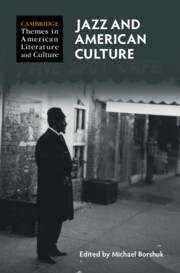Book contents
- Jazz and American Culture
- Cambridge Themes in American Literature and Culture
- Jazz and American Culture
- Copyright page
- Contents
- Contributors
- Acknowledgments
- Introduction
- Part I Elements of Sound and Style
- Part II Aesthetic Movements
- Part III Cultural Contexts
- 9 Jazz Slang, Jazz Speak
- 10 Jazz Cool
- 11 The Institutionalization of Jazz
- 12 Jazz Abroad
- Part IV Literary Genres
- Part V Images and Screens
- Bibliography
- Index
10 - Jazz Cool
from Part III - Cultural Contexts
Published online by Cambridge University Press: 09 November 2023
- Jazz and American Culture
- Cambridge Themes in American Literature and Culture
- Jazz and American Culture
- Copyright page
- Contents
- Contributors
- Acknowledgments
- Introduction
- Part I Elements of Sound and Style
- Part II Aesthetic Movements
- Part III Cultural Contexts
- 9 Jazz Slang, Jazz Speak
- 10 Jazz Cool
- 11 The Institutionalization of Jazz
- 12 Jazz Abroad
- Part IV Literary Genres
- Part V Images and Screens
- Bibliography
- Index
Summary
The modern usage of cool was developed by jazz musicians as part of their in-group slang in post-World War II New York City. This linguistic fact remains unrecognized within scholarship on jazz, etymology, and popular culture. For jazz musicians, cool signified a calm state of mind, a relaxed style of performance, embodied composure, and a melodic low-key musical aesthetic. The roots for these meanings of cool are to be found in West African languages and drumming practices, rather than English language precedent. During the Cold War, European authors embraced jazz as a key element of rebellion against totalitarianism, with the jazz musician elevated as a literary figure of American existentialism. The cool musical aesthetic became a global style through Frank Sinatra, Billie Holiday, and Chet Baker, and then through the bossa nova. Once the term and concept was adapted and appropriated by white writers and jazz fans, “cool” became a generalized emblem and synonym for rebellion.
Keywords
- Type
- Chapter
- Information
- Jazz and American Culture , pp. 159 - 172Publisher: Cambridge University PressPrint publication year: 2023

